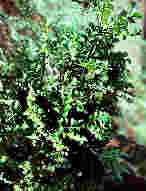
Foliage (8).
|
Phyllocladus toatoa Molloy 1996
Common NamesToatoa (Maori) (1), blue celery pine (9).Taxonomic notesSyn: Phyllocladus glauca Kirk 1869 non Carriere 1855.Description"Dioecious or monoecious tree up to 15 m, trunk up to 6 dm diameter. Phylloclades alternately pinnately arranged on whorled rachides up to 4 dm long. Leaves of juveniles up to 1.5 cm long, linear, obtuse to subacute, deciduous; of adults much smaller. Phylloclades 10-12 per rhachis, rhomboid, unequally cuneate at base, to broadly ovate or oblong, glaucous below when young, 4-6 × 2-4 cm, shallowly to deeply lobed, margins finely crenately lobulate; leaf-denticles small, subulate, curved. Male strobili in clusters of 10-20, terminal, pedicels equalling staminal portion, 1-2.5 cm long; apiculus broadly oblong. Ovules in globose heads, 4-7 together, seated towards base of rhachis on pedicels ca. 5 mm long. Mature heads up to 15 mm long; carpidia thick, upper margin truncate; seeds nutlike, exserted beyond white cupule, ca. 3 mm long" (2).RangeNew Zealand: NW N Is, lowland and montane forest from lat. 35° to 39° S at 850-1000 m elevation (1, 2). Locally common on relatively infertile soils in lowland and montane forests from the central North Island northwards. It is well protected and not considered to be a threatened species (11).Big TreeOldestOne tree-ring chronology, presumably based on living tree material, covers 441 years (10).DendrochronologyFour tree-ring chronologies were collected in the early 1970s by the Americans Valmore C. LaMarche Jr. and Peter Dunwiddie in what were evidently the first explorations of the dendrochronological characteristics of the species (3, 4). Shortly thereafter, the Australians and New Zealanders began work in the area, assembling chronologies for a variety of native gymnosperms and successfully applying them to a variety of problems in work summarized by D.A. Norton, John Ogden and J.G. Palmer (5, 6). Recently, the species has been employed in a reconstruction of New Zealand climate indices since A.D. 1731 (7).EthnobotanyObservationsRemarksSee also Paleobotany of Australia and New Zealand conifers.Citations(1) Silba 1986 (as P. glaucus).(2) Allan 1961 (as P. glaucus). (3) Dunwiddie 1979 (as P. glaucus). (4) Ogden & Dunwiddie 1982 (as P. glaucus). (5) Norton & Palmer 1992 (as P. glaucus). (6) Palmer & Ogden 1992 (as P. glaucus). (7) Salinger et al. 1994 (as P. glaucus). (8) (9) From the cover of the February 1997 issue of the American Journal of Botany (as P. glaucus). (10) International Tree-Ring Data Bank, chronology NEWZ009, limiting dates 1535-1976 (as P. glaucus). (11) B. P. J. Molloy. 1996 A new species name in Phyllocladus (Phyllocladaceae) from New Zealand. New Zealand Journal of Botany 34: 287-297. Abstract online at URL=http://www.rsnz.govt.nz/. |
|
Phyllocladus | Podocarpceae | home
This page is from the Gymnosperm Database
|